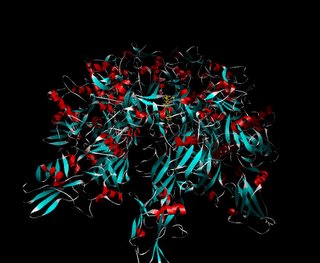
(Image of the anthrax toxin protective antigen heptamer
by Carlo Petosa of EMBL Grenoble Outstation, France)
BSE, H5N1, toxins ...
"Bacterial toxins are the major Biological Weapon
reagents, however, fungal toxins (mycotoxins) and algal
toxins (phycotoxins) are also considered as targets in
future. These toxins are already discussed in the
standpoint of food safety, it is time to set-up an Asian
research center for myco and phyco-toxins to study the
fungal/algal origins, toxicology, residue in foodstuffs,
human/animal exposure, and handling."
It is a matter of importance as we can see that food
chain is threatened by natural or human manipulation
causes. Today: mutton, beef, poultry, tomorrow... the
sea ? This is the analysis from a world specialists on
Bioresearch. His name being protected for obvious
reasons by the owner of this blog.
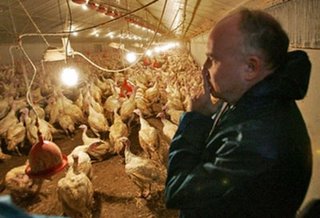
Japan's decision Friday to suspend imports of French
poultry and poultry products, including foie gras,
signaled the potential impact and pschycological fear on
food and toxicity, even before the confirmation that the
deadly H5N1 virus had decimated a farm of more than
11,000 turkeys at Versailleux in southeastern France.
Japan imported 1,664 tons of duck and other poultry meat
and 416 tons of internal organs, including foie gras,
from France in 2005. In France itself, there has been a
drop of up to 30 percent in poultry purchases in recent
weeks. President Chirac visiting on friday the Salon de
l'Agriculture noted the "economic and social
consequences" of panic and said the French must not fall
into such a trap. Chirac himself ate chicken and voiced
his concern to the Japanese authorities to re consider
their decision regarding the imports of food not linked
to the H5N1 alarm.
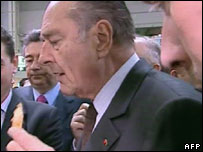
On this photo, President Chirac ate some chicken to prove his point
Chirac was informed that the H5N1 strain of the avian flu
virus had been confirmed at a commercial poultry farm
near Lyon just hours before he was supposed to inaugurate
the annual agriculture show in Paris. Around 11,000
turkeys had to be slaughtered while the farmer and five
family members were given Tamiflu as a precaution. In
addition, the family was taken to a nearby hospital and
put under quarantine.
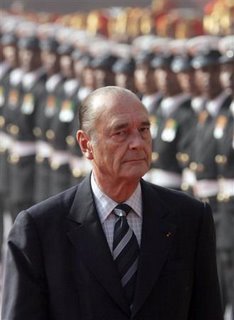
Nevertheless, Chirac appealed to the French press not to
create an atmosphere of alarm. "There is no interest in
provoking a psychosis, a panic, it's scandalous," he said
at the agriculture fair that was conspicuously absent of
any poultry not withstanding the piece of chicken that
the president was eating to demonstrate the safety of
French fowl.
It is the first time a farm in the European Union has
been affected. France already had cases in wild ducks.
Despite reassurances that it is safe to eat cooked
poultry, sales in France have dropped by up to 30%.
"Unfortunately you can see a completely unjustified sort
of total panic developing" President Chirac say.
Japan has already announced an import ban with immediate
effect. The turkey farm in the eastern Ain department of
the country where the poultry case of H5N1 was
discovered, is just 200m from the lake where the two wild
ducks were detected. A massive vaccination programme is
already under way.
No need to confuse entrepreneurs, markets and consumers!
The real question is that "Global agricultural
authorities should harmonize with the public-health
sector to ensure the exchange of flu virus samples, and
establish a single international standard for vaccines,
say Robert Webster and Diane Hulse of St Jude Children's
Research Hospital, Division of Virology, Memphis,
Tennessee. Some discussions ahead... But what for now?
The virus is spreading.
"We know that a flu pandemic will occur, but not when.
Already in Asia the H5N1 avian flu virus has infected
people, and killed. For these outbreaks to become a
pandemic, the only ingredient lacking is consistent
human-to-human transmission. We do not know yet if the
H5N1 vector has this capability ? if it does, the
effects will be catastrophic."
Certain aspects of pandemic planning have been well
considered. But a global strategy for preventing
pandemics at their source, in the animals, mostly
poultry, that carry the virus, had received relatively
little attention.
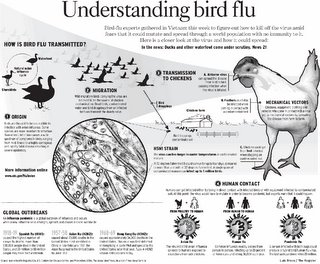
The lethal strain has spread from Asia to at least 10
European countries and Africa, and scientists fear it
could mutate into a form that is easily transmitted
between humans, sparking a pandemic. The disease has
killed at least 93 people, mostly in Southeast Asia.
Indonesia recorded its 20th human death from bird flu
Saturday, as China reported two new cases of human
infection and India said two poultry farms in western
Gujarat state had been contaminated by the virus in that
nation's second known outbreak.
No human cases of bird flu have been reported in the EU
but French authorities sealed off the infected turkey
farm Thursday.
The farmer's family was quarantined and vehicles passing
through a protection zone around the farm were required
to ride through a 100-foot-long trough of disinfectant.
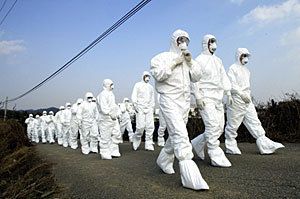
News that bird flu had spread to farm stocks was
particularly bitter for France, which has been working
for months to prevent and prepare for an outbreak.
France has some 200,000 farms that raise 900 million
birds each year. In 2004, the latest year for which
figures are available, the French poultry sector
generated more than $3.6 billion in revenues - more than
20 percent of the EU's total poultry production.
The head of France's powerful farm union, Jean-Michel
Lemetayer, asked Chirac to demand financial aid from the
EU. Agriculture Minister Dominique Bussereau said Friday
that authorities were perplexed about how the virus
appeared in commercial poultry despite precautionary
measures.
The farm is located in a protection zone set up after two
wild ducks died and were confirmed infected with H5N1.
There was speculation the outbreak may have been caused
by duck droppings on straw placed in the turkey pens,
France's Poultry Industry Association said. Claude
Lassus, the veterinarian for the Versailleux farm, told
to the French radio Friday that he believed the straw
theory was the only explanation for the infection.
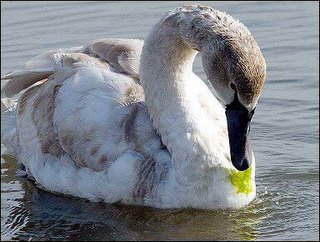
France who announced its immediate measures, in a move
based on transparency and guarantee of moral
responsibility towards world consumers, confirmed the
presence of the H5N1 avian flu virus in farm poultry in
the Ain region, Feb. 25. The jump from wild birds to
domestic poultry indicates too that concern over the
avian flu has turned into a chronic issue in the world's
agricultural industry, same cannot be said by the US and
Canada as illustrated with the recent US Beef BSE (mad
cow) cases. Worst : What about the sanitary situation of
emerging nations or exporters lacking healthy ethics?

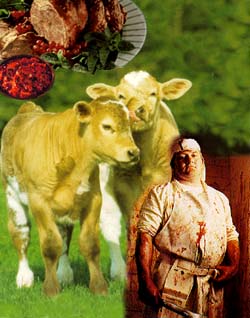

Contrary to the USA where cases proved and complaints
mean investigations, in Europe the announcement followed
a meeting of EU health ministers to develop awareness and
discuss preventive measures to be taken in case of a flu
outbreak. France also orchestrated a simulation to test
hospital reactions to human cases of avian flu.
The threat remains highest among the bird population, and
the jump from wild to domestic birds will cause Europe to
cull of millions of poultry and to lose billions of
dollars. Other nations in EU started massive investigations.
The EU Commission approved a request Feb. 23 from France
and the Netherlands to vaccinate certain bird flocks. The
Netherlands plans to inoculate free-range birds, which
are most vulnerable to contact with wild fowl. France, on
the other hand, has been granted permission to vaccinate
wild birds, not domestic poultry, in three regions where
the virus was found. The Feb. 25 announcement could
spur France to request permission to widen the net of
bird vaccinations.
Some European states, including Germany and Italy,
disagree with vaccinations; but others, like the United
Kingdom, are considering the approach. The Netherlands
required protections from market discrimination against
inoculated poultry, but this measure applies to countries
within the European Union, not markets abroad. Concern
over importing vaccinated poultry will undoubtedly worry
customers. Japan, which already bans American beef,
barred French poultry imports on Feb. 24.
Inoculations, however, are a stopgap measure. Shots do
not prevent infection, which means the virus is not
eliminated fully. Birds live, but still can be infected,
allowing the virus to mutate. Farm conditions often
hasten the speed of transmission in Europe, unlike in
Asia where most infections occur on smaller farms. The
French farm where the infected turkey is not considered a
large facility; it had more than 11,000 birds.
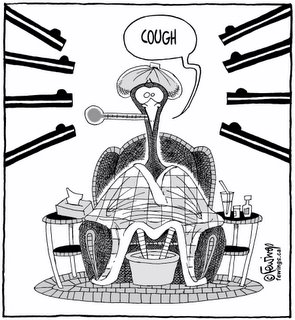
Officials are culling every turkey on the French farm,
but every bird on every farm surrounding that farm will
also have to be culled. The pattern will repeat itself
every time a domestic bird with avian flu is found across
the continent. This is devastating for France's poultry
industry, which is the largest in Europe.
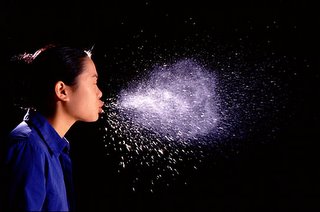
Europe is the continent where regulations work and are
followed with effects since the mad crow crisis of the
80's, because of a strong consumers association and NGOs'
awareness working in dual effects with the administration
of 25 EU nations. Key is the regulation power. But
other cases of H5N1 already follow across the world, more
frightening as fears remain high on lack of sanitary
control in the USA, Canada, Asia and Africa where
unscrupulous meat and poultry traders lack clear rules and
medical expertise. These are urgent questions to be
addressed.
A point well taken by the Japanese pharmaceutical
industry asking for consultation to the Institut Pasteur
and to the French scientific community of the the CNRS
institute whose president Bourguignon came to Japan on
friday to discuss various aspects of sciences, research
and development, and pathologies with some Japanese
medical experts and pharmaceuticals giants such as
Hayashibara Corp. located in the Okayama prefecture.
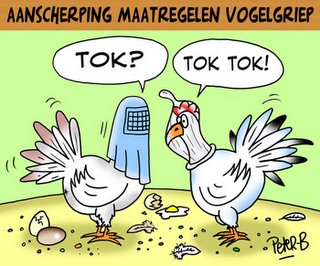
But there is an other cause of concern : One example is
scary. A scientist : "During the 1960s and early 1970s,
military biological weapons contractors with intimate
ties to leading drug industrialists prepared mutants of
influenza and para-influenza viruses recombined with
acute lymphocytic leukemia viruses. In other words, they
stockpiled a quick spreading cancer virus which may also
be deployed."
The United Nations released a report that stated as many
as 150 million people worldwide might die from this avian
flu. Well, then OK. No need to panic. But time to act!
Prior to H5N1 Avian Flu, what was highly suspicious,
mysterious and terrifying including with the arrival of
SARS, however, was TIMING. It synchronously arrived with
the global war on terrorism, and the Anglo-American war
with Iraq. Now a big thrill. (To take with a pinch and
read with magnifying glass;-))
Quote :
"Avian Flu - Vaccination Fraud Debunked " An other
confabulation of Dr. Leonard G. Horowitz :
"New biological threats, the "war on terrorism," and
increasing numbers of "natural disasters" including
space-based threats and super-storms were considered
economically and politically expedient compared with the
first and second world wars. These "conflicts short of
war" were decidedly more manageable and economically
viable. For this reason, especially their profitability,
they were leading options among Anglo-American policy
makers.
Nelson Rockefeller's protégé, Henry Kissinger, for
instance, as National Security Advisor (NSA) under
Richard Nixon, oversaw foreign policy while considering
Third World population reduction "necessities" for the
U.S., Britain, Germany, and other allies. This Bush
nominee to direct the 9-11 conspiracy investigation, a
reputed war criminal, then selected the option to have
the Central Intelligence Agency (CIA) develop biological
weapons, according to the U.S. Congressional Record of
1975. Among these new man-made biological weapons were
germs far deadlier than the avian flu.

For example, by 1968, when Kissinger requested and
received updated intelligence on useful "synthetic
biological agents" for germ warfare and population
control, mutant recombinant flu viruses had just been
engineered by Special Virus Cancer Program researchers
O'Conner, Stewart, Kinard, Rauscher and others. During
this program, influenza and parainfluenza viruses were
recombined with quick acting leukemia viruses (acute
lymphocytic leukemia) to deliver weapons that potentially
spread cancer, like the flu, by sneezing. These
researchers also amassed avian cancer (sarcoma) viruses
and inoculated them into humans and monkeys to determine
their carcinogenicity. In related efforts, Raucher et
al. used radiation to enhance avian virus's
cancer-causing potential. These incredible scientific
realities have been officially censored and generally
neglected by the media's mainstream.
Similarly, the Institute of Science in Society (IoSS) in
London raised the genetic engineering question in the
origin of SARS. "Could genetic engineering have
contributed inadvertently to creating the SARS virus?"
they asked. "This point was not even considered by the
expert coronavirologists called in to help handle the
crisis, now being feted and woed by pharmaceutical
companies eager to develop vaccines." Those living in
glass houses should not throw stones. The above emphasis
is added to show IoSS they had "not even considered"
intentional SARS deployment in their scientific,
allegedly unbiased, purview.

Conflicts short of war, like the "War on AIDS," "War on
Drugs," "War on Terrorism," "War on Cancer," and now "War
on the Avian Flu" require sophisticated propaganda
programs employing fear campaigns for social acceptance
and popular support of legislated policies." End of
quote.
"Avian Flu - Vaccination Fraud Debunked " is an other
confabulation of Dr. Leonard G. Horowitz, of course.
But... what if... ?
















